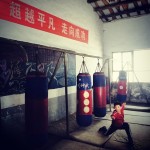“The waters of the Yangtze roll to the east, heroes come and go like foam on the waves.”
This line is from an old chant that starts off one of China’s great classic novels, The Romance of the Three Kingdoms. The novel describes the complicated struggle of three small kingdoms and their heroes in the aftermath of the fall of the Han Dynasty. The most famous of the heroes are the three brothers of Shu who swore an oath of loyalty under the peach tree: Zhang Fei, Guan Yu, and Liu Bei; their advisor the Merlin-esque Zhuge Liang; and their primary adversary, Cao Cao king of Wei.
Many different hero archetypes take the stage during the struggles for primacy over ancient China. There is Zhang Fei, the fiery warrior who rages fearlessly across the battlefield, taking on great odds and “facing the north wind with a wine cup in his hand.” In most depictions of Zhang Fei, he has a huge beard and a red face, bulbous features and wild eyes. He only knows how to fight; he was betrayed and murdered by his subordinates, who saw defeat written on the wall.
His Western counterpart would be Ares the God of War, Achilles, or maybe Thor the Thunder God, none of whom can stand to walk away from a fight or think their way out of one. These are the heroes who represent the wild passions of combat, the reckless love of the challenge and the corresponding disdain of anything not related to battle, blood, and glory. Zhang Fei reminds me of Conan the Barbarian, and his famous quote about lamenting women.
Then there is Zhang Fei’s sworn brother, Guan Yu, the beloved general who is loyal to the furthest extreme. Nothing would shatter Guan Yu quicker than being forced to go back on his word, or leave the battlefield without all of his men. Guan Yu spent most of the novel mopping up after Zhang Fei’s errors and protecting the indecisive Liu Bei from the predations of the world. Respect, honor, modesty … these qualities led Guan Yu to lead his army into battle against a superior foe and eventually get captured. He was executed after he refused to surrender and betray Liu Bei, his sworn brother and the king of Shu.
Guan Yu is a common character in Chinese stories. His loyalty and innate goodness border on naiveté and his death is always tragic, usually in defense of a lost cause and at the hands of a less honorable enemy. Greek mythology has these tragic figures, but I always think of the Gaul king Vercingetorix who fought Caesar and lost, or Tecumseh and his final stand against the armies of invading European settlers. In tragic defeat, these heroes express what is most admired and most difficult to emulate: iron principles in an unprincipled world.
Another hero archetype in The Romance is Zhuge Liang, the mastermind. He defeats armies with tricks and stratagems. Like Merlin the magician, Zhuge Liang weaves stories and plots around hot headed warriors leaving them in awe of the “supernatural.” But it’s not magic, just brilliant thinking outside the box, adapting on the fly to difficult situations, and the bold willingness to toss the dice on lightning quick observations of character and psychology.
In truth, although these heroes have their dominant expression, they are actually complicated mixtures of the major archetypes. Bold and brash in battle, loyal and honorable with friends, brilliant and innovative when everything is on the line.
Over the next few days, we are going to see modern day representatives of the many-faced hero fight it out on the world stage. The promoters have been lucky and done great work with their luck to create a dozen or more clashes of character: Paige versus Rose in a battle of two different Amazons; Cody the Bland versus Sage the Beautiful; Rockhold versus Weidman expressing two sides of an All-American coin … Frankie and Chad in a battle of the two princes.
The most compelling battle is of course the final fight of the weekend, McGregor versus Aldo. Like Achilles, the Irish legendary hero Cu Chullain was a mouthy, brash warrior who was loyal to a fault and enjoyed the finer things in life just as much as he enjoyed crushing his enemies. McGregor seems to have torn many a page out of that archetypical Irish hero’s book.
Aldo on the other hand represents the quiet family man who came up from the slums and shuns the spotlight other heroes long for. Yet all of his opponents claim he transforms into the Beast when he fights, becoming Ares incarnate, tempered by focused technique.
Which heroes will survive to win glory? Which heroes will fade away like foam on the waves? In the end, we can turn back to The Romance for a prediction of things to come:
“滚滚长江东逝水,浪花淘尽英雄。是非成败转头空。青山依旧在,几度夕阳红。白发渔樵江渚上,惯看秋月春风。一壶浊酒喜相逢。 古今多少事,都付笑谈中。”
“The waters of the Yangtze roll to the east, heroes come and go like foam on the waves. Right or wrong, win or lose, a single turn of the head and everything fades away. The green mountains are still there, the sunsets remain red. The old fisherman on the spit has seen the autumn moon and felt the spring wind. Friends are still welcome over a pitcher of cheap wine. Everything that took place from way back then until this very day just ends up a part of our laughing chat sessions.”





